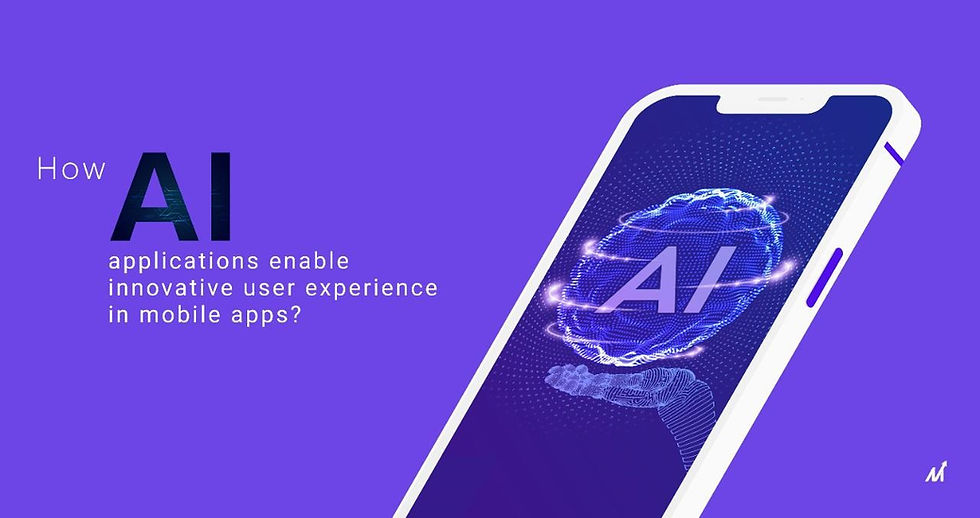How AI Applications Enable Innovative User Experience In Mobile Apps?
- Mar 30, 2022
- 7 min read

AI is no longer only for big companies such as Amazon, Microsoft, Netflix etc. For instance, take Siri; the AI-powered virtual assistant is one of Apple's most popular AI applications. Cortana is another popular virtual assistant provided by Microsoft. These apps are among the top AI applications, and have millions of users worldwide. However, AI in business and mobile apps offer more features than just chatbots and virtual assistants.
In the present, AI is embedded into the manufacturing processes and products of most industries. Here, in this blog, we'll take a look at the way AI applications allow for a more innovative mobile applications that provide a better user experience. And how mobile app development using AI has a positive impact on diverse industries.
How do you think AI revolutionized the mobile application industry?
Artificial Intelligence or AI has developed and gained popularity over the last few decades. In the 1950s, scientists conducted academic and scientific research on AI. It was described as 'thinking machines' in the words of Alan Turing in his famous research paper. However, there was not any progress in the integration of Artificial Intelligence into mobile apps. Because of the lack of data to allow machines to learn about the real world. Additionally, the absence of money and processing power has slowed the development of AI technology.
Today, Artificial Intelligence can yield huge business benefits. When you integrate it into your enterprise application development. AI applications have revolutionized the user experience in mobile applications.
As per Gartner, the business value of AI will reach over 3 billion dollars within the next few years. With the rapid growth of technological advancement, investment and research, Artificial Intelligence has become an essential tool in business to disrupt industries. A crucial tool in mobile app development , it can help empower enterprises.
If you're wondering:
What exactly is AI?
How is AI implemented into applications across different industries?
How can AI deliver outstanding and innovative user experiences in applications across different industries?
How is AI applied to various mobile applications?
We've provided answers to all of these questions in this article.
What is AI and how does it function in mobile applications?
What exactly is AI?
Artificial Intelligence (AI) refers to the capacity of a computer system or computer-controlled robot that can display intelligence and inspire human behaviour or thought. In simple terms it's the capability of a machine or software to be able to think and learn from experiences. John McCarthy defined Artificial Intelligence as "the science and engineering behind the creation of intelligent machines." A AI integrated app is trained by analyzing large amounts of data, and is designed to solve specific problems and perform complex tasks. It's, in essence, a combination from Deep Learning and Machine learning. As a result, AI models have the ability to make intelligent choices. The Science Daily journal defines Artificial Intelligence as "the study and creation of intelligent agents. an intelligent agent is one that detects its surroundings and takes actions which maximize its chance of success."
What is the process by which AI perform in mobile applications?
Have you used automatic switching of lights at your workplace or home? Or the smart TV that detects your voice and then performs actions. These are some day-to-day illustrations of AI. Similarly, mobile applications for different industries employ AI for data visualization, speech recognition, real-time analytics and many other features. Most enterprises today are using AI in some way or the other. AI mobile applications are gaining ground in a variety of sectors. A report suggests AI applications will generate 126 billion dollars by 2025. (AI) application's revenue will surpass around 126 billion dollars by 2025 in the world. (Statista)
AI applications in all industries
The technology of predictive analysis and the intelligence of AI have been utilized across a variety of industries. Hence, the growing interest in Artificial Intelligence has shifted to being more specific to industry. For example, "AI in Manufacturing" is one of the top searches on Google. Implementing and expanding AI within mobile applications has been an effective strategy for creating business value. How can you incorporate AI in your enterprise app development, UX design, and the user interface of your app? In essence, it is based on your specific industry needs and the current trends. Let's explore the ways AI applications are utilized and their effects in various industries.
AI Applications in Healthcare
AI in Healthcare is estimated to be at USD 95.65 by 2028. This will increase from 6.60 billion in 2021 with 46% from CAGR(Compound Annual Growth Rate). (Source: GlobeNewswire)
Integration of AI in the Healthcare sector has led to a wide range of Healthcare services. As with personalized healthcare, it allows for personal data analysis that allows for better diagnosis, using patients' data sets as well as early or assisted diagnosis discovery of drugs, etc.
The investments for AI in Healthcare are estimated to grow at an annual 48% rate between 2017 until 2023 (Source: Business Insider Intelligence's Digital Health Ecosystem Report). This implies more and increasing integrations of AI in Healthcare apps in the coming years.
By using The Internet of Medical Things (IoMT), AI connects endpoint devices and apps with Healthcare IT systems. It's enabled monitoring in real-time, drug management better chronic care management and improved patient engagement.
The potential of AI can also be utilized for the power of surgical robots which have reduced the variability of surgeons in complex surgery. The use of surgical robots can provide crucial insights into medical practices that are accurate with the help of millions of data.
Senior care was difficult to manage due to the outbreak of the Covid-19 pandemic. AI has been able to offer solutions through health assistants. One of the most innovative examples is ' Elliq,' a robot health assistant that assists those who require help, designed in collaboration with Intuition Robotics. The need for care for the day is met by many like AI solutions.
AI-based applications in Finance
The application of AI within banks is principally for protecting customer identities as well as mimicking live employees and enhancing digital interactions. Banks using AI will be able to facilitate the customer to have 24/7 interactions with customers across channels. Alongside custom communications and solutions for specific clients.
As per Forbes, 70% of financial companies use machine learning to spot fraud, predict cash flow and credit events and then adjust credit scores.
From Robo-financial advisors that analyze large amounts of data within an extremely short time to fraud detection. AI has been utilized in finance to drastically improve banking and financial services.
The risk management tools used by banks make use of a variety of data sets available and offer accurate insight.
Human agents have been replaced by smart Robo financial experts. And AI-based chatbots for customer support and a more pleasant customer experience.
Through detecting fraudulent financial behavior, AI has leveraged security in banking by making use of a range of information points. Fraud detection and prevention use is a popular practice in the field of payment to enhance the safety of online payment platforms.
AI applications in e-commerce and Retail
In the report by Mordor Intelligence that the global use of artificial intelligence market in the retail market is predicted to make in a leap at a rate of 35% in the timeframe of 2021 to 2026. AI in e-commerce and Retail has improved the overall functioning of the industry like customer experience, inventory management, forecasting and forecasting, among others.
With the help of deep and machine training, AI has been instrumental in providing immediate insights from the data. Do you know how the Amazon application recommends items to you? Amazon makes use of the AI algorithm to decide which products you're most likely to add to your cart.
An advanced type of AI in Retail is "Computer vision," which brings near-real-time-intelligence to your brick-and-mortar stores. You can say that there is plenty to come for the retail industry in future , especially for Retail AI application development.
AI Applications in Manufacturing
The manufacturing industry is at the forefront of utilizing and making use of AI. An Mckinsey study indicates that AI in Manufacturing can improve the forecasting accuracy by 10-20% which implies a 5% reduction in inventory costs as well as an increase of 2 to 3 percent in profits.
AI has enabled a wide range of tasks related to the manufacturing industry. Industrial robots equipped with AI are an integral part of the manufacturing process. Bots that can be programmed to collaborate with workers to complete repetitive tasks.
In addition to advanced robots AI applications have enabled greater efficiency, higher quality products production design, and analytics.
AI software applications for Manufacturing enable automated quality control, defect detection to pre-emptive maintenance.
AI applications are used in Real-Estate
The real estate sector is using AI for buying, selling finance for home, renovations and more.
AI-based real estate applications can learn from user behaviour and provide a better and more effective user experience. From accurate assessments to market predictions, AI is changing buying selling, financing, and home buying.
AI algorithms can handle millions of documents related to real estate in a matter of seconds. With the help of the massive data available for property values as well as debt levels, and personal information, custom solutions are being delivered for those in the real estate business.
The AI technology enables agents and brokers to predict the future value of an asset in a particular market. AI can be employed in real estate applications in more innovative ways to serve the changing and varied needs of clients and users.
Airbnb utilizes AI in smart pricing algorithms and guest background checks that are AI-powered. Find out more about the app's development of Airbnb here.
Artificial Intelligence: Future of AI
The technological advancements in AI research and creative thinking to use AI in mobile apps will lead to successful apps across all industries. A majority of industries are harnessing the power of AI thanks to tech companies. Large tech companies such as Apple, Google and Amazon have helped facilitate these advancements. AI in different industries has addressed issues like privacy, data security, compliances and regulations.
Although the benefits of AI are being utilized in the mobile app industry, there are certain difficulties too. For instance, the cost of using AI into apps, the need to be knowledgeable of technology and the ability to locate expert developers for app deployment. But, the implementation of AI in mobile apps is definitely the future of many industries.
Learn more about the latest mobile app trends here.
Find out more information about who we are here.
First published here



Comments